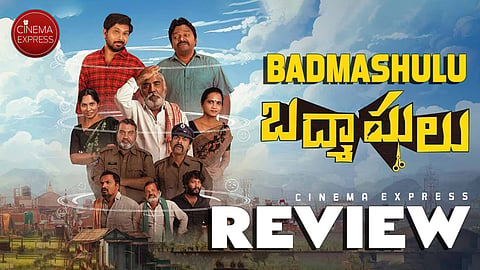Badmashulu movie review: A slow-paced rural comedy with amusing characters
Badmashulu movie review(2.5 / 5)
Two middle-aged men dance their way through life like overgrown backbenchers who decide to never abide by the rules. Badmashulu, written and directed by Shankar Cheguri, operates entirely in that delightful zone. It’s not a loud, laugh-a-minute comedy, nor is it particularly inventive. But it’s sincere, charming, and most importantly, kind. It asks very little of the viewer, and if you’re willing to meet it halfway, it will reward you with a smile or two and a surprisingly warm aftertaste.
Director: Shankar Cheguri
Cast: Mahesh Chintala, Vidya Sagar Karampuri, Muralidhar Goud, Deeksha Koteswar, Kavitha Sriranga
Set in a passive village, the film follows Tirupati (Mahesh Chintala), a bumbling tailor and his barber buddy Mutyalu (Vidya Sagar Karampuri), as they drift through life on the fumes of mischief. When their antics land them in police custody, they somehow manage to colonise the station itself, continuing their thievery from within, much to the exasperation of the local constables. What unfolds is not a plot-heavy roller coaster, but a series of dryly amusing vignettes that slowly start to say something about friendship, purpose of life, and how the mischief of the underdog is often more human than the righteousness of the system.
Mahesh Chintala is the soul of the film, and it would not hold together without him. He plays Tirupati with the elastic physicality of a cartoon character and the verbal timing of a seasoned comedian. His energy is unrelenting, and even when the script begins to repeat itself, he continues to invent new tics, twitches and twirls to keep the character lively. He is the rare performer who is genuinely funny without trying too hard to be. There’s something Chaplin-esque in his ability to make you root for a character who’s essentially a nuisance to society.
Vidya Sagar’s Mutyalu, is more functional. He lacks the rhythm to match Mahesh's Tirupati, and the contrast makes his presence feel a little muted. That said, the camaraderie between the two does eventually click, especially when they are let loose in the police station and treat it like a personal playground. There’s something deeply satisfying about watching grown men behave like overgrown boys in a system that’s too tired to care. Everybody is tired; the constables, the wives, the villagers. It’s delightful to see everyday people just ignore these crooks and let them play.
The writing, however, is where Badmashulu keeps tripping over its own laces. The jokes are more amusing than hilarious, and while the humour has a naturalistic charm, it never quite crescendos into memorable scenes. There are a few clever lines here and there, but the film often settles for the chuckle when it could have gone for the belly laugh. In that sense, it’s not a riot, it’s more like a pleasant, extended smirk.
The bigger problem lies in the film’s tendency to over-rely on its initial beats. Once Tirupati and Mutyalu are established, their antics begin to blur into each other. The same pranks, the same faces, the same complaints repeat for far too long. Sure, the film offers that distinct freshness in portraying two idle, working-class men finding joy in minor rebellion. But the screenplay lacks escalation. Instead of growing into something louder, sharper, or stranger, it simply plateaus, leaving you mildly smiling rather than enjoying.
Technically, the film benefits from restraint. Vineeth Pabbathi’s cinematography keeps things grounded, using natural light and static compositions to let the actors shine. There’s no flashy camera work or manipulative lighting schemes here, just clean, honest frames that fit the world. Teja Kunuru’s music is fun and adds that folk, cinematic flavour to the film. Together, they create a rooted, celebratory atmosphere that allows the characters to feel like people you might actually run into at a village bus stop while elevating their quirky antics.
What elevates Badmashulu, in the end, is not its story or its structure, but its personality. The film never tries to moralise its characters with a typical lesson-learnt ending, instead it chooses to humanise them. Even in its final stretch, where it could easily have turned emotional, it chooses to remain calm. The petty criminals and worn-out policemen arrive at a mutual truce, not because justice is served or lessons are learnt, but because, well, everyone’s a little too tired and life is, anyway, difficult for all. It’s a rare kind of wisdom wrapped in a beautiful climax, one that offers gentle peace.
And perhaps that’s the film’s biggest strength. It does not pretend to be louder. It is not trying to redefine comedy or make a grand point about the rural underclass. It just wants to hang out with these two oddballs and see what happens. And if you’re patient enough to do the same, especially past the slightly sagging midsection, you might just walk away feeling surprisingly light.
Badmashulu may not be a groundbreaking work of comedy, but its low-key absurdity and lived-in charm are refreshing. It is a film that ambles, stumbles, and sometimes stalls, but never loses its sincerity.

